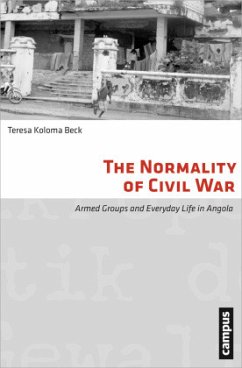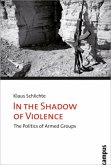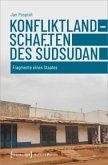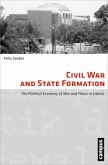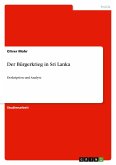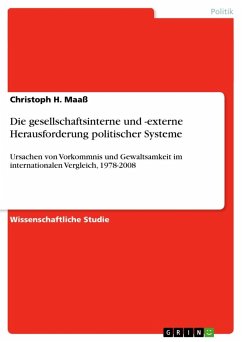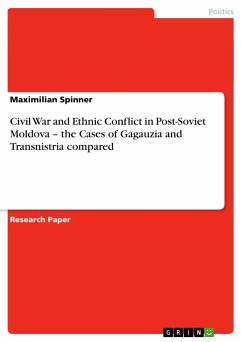- Broschiertes Buch
- Merkliste
- Auf die Merkliste
- Bewerten Bewerten
- Teilen
- Produkt teilen
- Produkterinnerung
- Produkterinnerung
Krieg gilt gemeinhin als Ausnahmezustand, den es zu überwinden gilt. Anhand der jüngeren Geschichte Angolas zeigt Teresa Koloma Beck, wie die Präsenz von Gewalt und Gewaltakteuren zur Herausbildung einer eigenen Normalität des Bürgerkriegs führen kann.Das Buch wirft nicht nur ein neues Licht auf soziale Dynamiken in Bürgerkriegen, sondern auch auf typische Probleme in Nachkriegsgesellschaften.
Andere Kunden interessierten sich auch für
![In the Shadow of Violence In the Shadow of Violence]() Klaus SchlichteIn the Shadow of Violence46,00 €
Klaus SchlichteIn the Shadow of Violence46,00 €![Konfliktlandschaften des Südsudan Konfliktlandschaften des Südsudan]() Jan PospisilKonfliktlandschaften des Südsudan39,00 €
Jan PospisilKonfliktlandschaften des Südsudan39,00 €![Civil War and State Formation Civil War and State Formation]() Felix GerdesCivil War and State Formation46,00 €
Felix GerdesCivil War and State Formation46,00 €![Der Bürgerkrieg in Sri Lanka Der Bürgerkrieg in Sri Lanka]() Oliver MohrDer Bürgerkrieg in Sri Lanka17,95 €
Oliver MohrDer Bürgerkrieg in Sri Lanka17,95 €![Die gesellschaftsinterne und -externe Herausforderung politischer Systeme Die gesellschaftsinterne und -externe Herausforderung politischer Systeme]() Christoph H. MaaßDie gesellschaftsinterne und -externe Herausforderung politischer Systeme47,95 €
Christoph H. MaaßDie gesellschaftsinterne und -externe Herausforderung politischer Systeme47,95 €![Eigendynamische Bürgerkriege Eigendynamische Bürgerkriege]() Stefan DeißlerEigendynamische Bürgerkriege35,00 €
Stefan DeißlerEigendynamische Bürgerkriege35,00 €![Civil War and Ethnic Conflict in Post-Soviet Moldova ¿ the Cases of Gagauzia and Transnistria compared Civil War and Ethnic Conflict in Post-Soviet Moldova ¿ the Cases of Gagauzia and Transnistria compared]() Maximilian SpinnerCivil War and Ethnic Conflict in Post-Soviet Moldova ¿ the Cases of Gagauzia and Transnistria compared17,95 €
Maximilian SpinnerCivil War and Ethnic Conflict in Post-Soviet Moldova ¿ the Cases of Gagauzia and Transnistria compared17,95 €-
-
-
Krieg gilt gemeinhin als Ausnahmezustand, den es zu überwinden gilt. Anhand der jüngeren Geschichte Angolas zeigt Teresa Koloma Beck, wie die Präsenz von Gewalt und Gewaltakteuren zur Herausbildung einer eigenen Normalität des Bürgerkriegs führen kann.Das Buch wirft nicht nur ein neues Licht auf soziale Dynamiken in Bürgerkriegen, sondern auch auf typische Probleme in Nachkriegsgesellschaften.
Hinweis: Dieser Artikel kann nur an eine deutsche Lieferadresse ausgeliefert werden.
Hinweis: Dieser Artikel kann nur an eine deutsche Lieferadresse ausgeliefert werden.
Produktdetails
- Produktdetails
- Mikropolitik der Gewalt 7
- Verlag: Campus Verlag
- Artikelnr. des Verlages: 39756
- Seitenzahl: 162
- Erscheinungstermin: Oktober 2012
- Englisch
- Abmessung: 217mm x 144mm x 12mm
- Gewicht: 256g
- ISBN-13: 9783593397566
- ISBN-10: 3593397560
- Artikelnr.: 35709287
- Herstellerkennzeichnung Die Herstellerinformationen sind derzeit nicht verfügbar.
- Mikropolitik der Gewalt 7
- Verlag: Campus Verlag
- Artikelnr. des Verlages: 39756
- Seitenzahl: 162
- Erscheinungstermin: Oktober 2012
- Englisch
- Abmessung: 217mm x 144mm x 12mm
- Gewicht: 256g
- ISBN-13: 9783593397566
- ISBN-10: 3593397560
- Artikelnr.: 35709287
- Herstellerkennzeichnung Die Herstellerinformationen sind derzeit nicht verfügbar.
Teresa Koloma Beck, Dr. phil., forscht an der Willy Brandt School of Public Policy der Universität Erfurt.
Contents
List of Acronyms 7
Acknowledgements 9
1.Introduction 11
1.1The problem: the expansion of civil war into everyday life 13
1.2The challenge: thinking the everyday 16
1.3The conceptual framework: theories of the everyday 19
1.4The case study: civil war in Angola (1976-2002) 21
1.5Outline of the book 24
2.Theorising violent conflict: state of research 27
2.1Micropolitical theories of violent conflict 28
2.2Social theory approaches to violent conflict 32
2.3Summary and implications for research 35
3.Normalities at war: a theoretical perspective on everyday
life in violent conflicts 39
3.1Subject and life-world: theorising "normal" experiences 40
3.2"Terror as usual": the transformation
of normality in violent conflict 57
4.Historical Background 69
4.1Pre-colonial societies and weak colonial rule 71
4.2The Estado Novo and the rise of nationalism 73
4.3From anti-colonial struggle to independence 75
4.4From independence to civil war 77
4.5The Civil War 79
5.From the bush movement to the quasi-state (and back):
UNITA as an organisation 83
5.1The militant anti-colonial guerrilla: 1966-76 85
5.2The successful armed group: 1976-1989 96
5.3Disintegration and decline: 1989-2002 104
6.Staging normality: UNITA as a life-world 109
6.1"I have always been a soldier":
recruiting members 111
6.2."Weapon, hoe and pen":
forming the UNITA combatant 113
6.3Like from a different world:
the success of UNITA's social project 117
7."We lived in an eternal war": life in the warscapes 121
7.1Defending everyday life: adaptations to civil war violence 124
7.2States of emergency: limits of normalisation 134
7.3Orders of violence: accommodation to armed
groups' rule 137
8.Conclusion 143
Bibliography 149
Index 161
Contents
List of Acronyms 7
Acknowledgements 9
1.Introduction 11
1.1The problem: the expansion of civil war into everyday life 13
1.2The challenge: thinking the everyday 16
1.3The conceptual framework: theories of the everyday 19
1.4The case study: civil war in Angola (1976-2002) 21
1.5Outline of the book 24
2.Theorising violent conflict: state of research 27
2.1Micropolitical theories of violent conflict 28
2.2Social theory approaches to violent conflict 32
2.3Summary and implications for research 35
3.Normalities at war: a theoretical perspective on everyday
life in violent conflicts 39
3.1Subject and life-world: theorising "normal" experiences 40
3.2"Terror as usual": the transformation
of normality in violent conflict 57
4.Historical Background 69
4.1Pre-colonial societies and weak colonial rule 71
4.2The Estado Novo and the rise of nationalism 73
4.3From anti-colonial struggle to independence 75
4.4From independence to civil war 77
4.5The Civil War 79
5.From the bush movement to the quasi-state (and back):
UNITA as an organisation 83
5.1The militant anti-colonial guerrilla: 1966-76 85
5.2The successful armed group: 1976-1989 96
5.3Disintegration and decline: 1989-2002 104
6.Staging normality: UNITA as a life-world 109
6.1"I have always been a soldier":
recruiting members 111
6.2."Weapon, hoe and pen":
forming the UNITA combatant 113
6.3Like from a different world:
the success of UNITA's social project 117
7."We lived in an eternal war": life in the warscapes 121
7.1Defending everyday life: adaptations to civil war violence 124
7.2States of emergency: limits of normalisation 134
7.3Orders of violence: accommodation to armed
groups' rule 137
8.Conclusion 143
Bibliography 149
Index 161
List of Acronyms 7
Acknowledgements 9
1.Introduction 11
1.1The problem: the expansion of civil war into everyday life 13
1.2The challenge: thinking the everyday 16
1.3The conceptual framework: theories of the everyday 19
1.4The case study: civil war in Angola (1976-2002) 21
1.5Outline of the book 24
2.Theorising violent conflict: state of research 27
2.1Micropolitical theories of violent conflict 28
2.2Social theory approaches to violent conflict 32
2.3Summary and implications for research 35
3.Normalities at war: a theoretical perspective on everyday
life in violent conflicts 39
3.1Subject and life-world: theorising "normal" experiences 40
3.2"Terror as usual": the transformation
of normality in violent conflict 57
4.Historical Background 69
4.1Pre-colonial societies and weak colonial rule 71
4.2The Estado Novo and the rise of nationalism 73
4.3From anti-colonial struggle to independence 75
4.4From independence to civil war 77
4.5The Civil War 79
5.From the bush movement to the quasi-state (and back):
UNITA as an organisation 83
5.1The militant anti-colonial guerrilla: 1966-76 85
5.2The successful armed group: 1976-1989 96
5.3Disintegration and decline: 1989-2002 104
6.Staging normality: UNITA as a life-world 109
6.1"I have always been a soldier":
recruiting members 111
6.2."Weapon, hoe and pen":
forming the UNITA combatant 113
6.3Like from a different world:
the success of UNITA's social project 117
7."We lived in an eternal war": life in the warscapes 121
7.1Defending everyday life: adaptations to civil war violence 124
7.2States of emergency: limits of normalisation 134
7.3Orders of violence: accommodation to armed
groups' rule 137
8.Conclusion 143
Bibliography 149
Index 161
Contents
List of Acronyms 7
Acknowledgements 9
1.Introduction 11
1.1The problem: the expansion of civil war into everyday life 13
1.2The challenge: thinking the everyday 16
1.3The conceptual framework: theories of the everyday 19
1.4The case study: civil war in Angola (1976-2002) 21
1.5Outline of the book 24
2.Theorising violent conflict: state of research 27
2.1Micropolitical theories of violent conflict 28
2.2Social theory approaches to violent conflict 32
2.3Summary and implications for research 35
3.Normalities at war: a theoretical perspective on everyday
life in violent conflicts 39
3.1Subject and life-world: theorising "normal" experiences 40
3.2"Terror as usual": the transformation
of normality in violent conflict 57
4.Historical Background 69
4.1Pre-colonial societies and weak colonial rule 71
4.2The Estado Novo and the rise of nationalism 73
4.3From anti-colonial struggle to independence 75
4.4From independence to civil war 77
4.5The Civil War 79
5.From the bush movement to the quasi-state (and back):
UNITA as an organisation 83
5.1The militant anti-colonial guerrilla: 1966-76 85
5.2The successful armed group: 1976-1989 96
5.3Disintegration and decline: 1989-2002 104
6.Staging normality: UNITA as a life-world 109
6.1"I have always been a soldier":
recruiting members 111
6.2."Weapon, hoe and pen":
forming the UNITA combatant 113
6.3Like from a different world:
the success of UNITA's social project 117
7."We lived in an eternal war": life in the warscapes 121
7.1Defending everyday life: adaptations to civil war violence 124
7.2States of emergency: limits of normalisation 134
7.3Orders of violence: accommodation to armed
groups' rule 137
8.Conclusion 143
Bibliography 149
Index 161
Contents
List of Acronyms 7
Acknowledgements 9
1.Introduction 11
1.1The problem: the expansion of civil war into everyday life 13
1.2The challenge: thinking the everyday 16
1.3The conceptual framework: theories of the everyday 19
1.4The case study: civil war in Angola (1976-2002) 21
1.5Outline of the book 24
2.Theorising violent conflict: state of research 27
2.1Micropolitical theories of violent conflict 28
2.2Social theory approaches to violent conflict 32
2.3Summary and implications for research 35
3.Normalities at war: a theoretical perspective on everyday
life in violent conflicts 39
3.1Subject and life-world: theorising "normal" experiences 40
3.2"Terror as usual": the transformation
of normality in violent conflict 57
4.Historical Background 69
4.1Pre-colonial societies and weak colonial rule 71
4.2The Estado Novo and the rise of nationalism 73
4.3From anti-colonial struggle to independence 75
4.4From independence to civil war 77
4.5The Civil War 79
5.From the bush movement to the quasi-state (and back):
UNITA as an organisation 83
5.1The militant anti-colonial guerrilla: 1966-76 85
5.2The successful armed group: 1976-1989 96
5.3Disintegration and decline: 1989-2002 104
6.Staging normality: UNITA as a life-world 109
6.1"I have always been a soldier":
recruiting members 111
6.2."Weapon, hoe and pen":
forming the UNITA combatant 113
6.3Like from a different world:
the success of UNITA's social project 117
7."We lived in an eternal war": life in the warscapes 121
7.1Defending everyday life: adaptations to civil war violence 124
7.2States of emergency: limits of normalisation 134
7.3Orders of violence: accommodation to armed
groups' rule 137
8.Conclusion 143
Bibliography 149
Index 161
Contents
List of Acronyms 7
Acknowledgements 9
1.Introduction 11
1.1The problem: the expansion of civil war into everyday life 13
1.2The challenge: thinking the everyday 16
1.3The conceptual framework: theories of the everyday 19
1.4The case study: civil war in Angola (1976-2002) 21
1.5Outline of the book 24
2.Theorising violent conflict: state of research 27
2.1Micropolitical theories of violent conflict 28
2.2Social theory approaches to violent conflict 32
2.3Summary and implications for research 35
3.Normalities at war: a theoretical perspective on everyday
life in violent conflicts 39
3.1Subject and life-world: theorising "normal" experiences 40
3.2"Terror as usual": the transformation
of normality in violent conflict 57
4.Historical Background 69
4.1Pre-colonial societies and weak colonial rule 71
4.2The Estado Novo and the rise of nationalism 73
4.3From anti-colonial struggle to independence 75
4.4From independence to civil war 77
4.5The Civil War 79
5.From the bush movement to the quasi-state (and back):
UNITA as an organisation 83
5.1The militant anti-colonial guerrilla: 1966-76 85
5.2The successful armed group: 1976-1989 96
5.3Disintegration and decline: 1989-2002 104
6.Staging normality: UNITA as a life-world 109
6.1"I have always been a soldier":
recruiting members 111
6.2."Weapon, hoe and pen":
forming the UNITA combatant 113
6.3Like from a different world:
the success of UNITA's social project 117
7."We lived in an eternal war": life in the warscapes 121
7.1Defending everyday life: adaptations to civil war violence 124
7.2States of emergency: limits of normalisation 134
7.3Orders of violence: accommodation to armed
groups' rule 137
8.Conclusion 143
Bibliography 149
Index 161
List of Acronyms 7
Acknowledgements 9
1.Introduction 11
1.1The problem: the expansion of civil war into everyday life 13
1.2The challenge: thinking the everyday 16
1.3The conceptual framework: theories of the everyday 19
1.4The case study: civil war in Angola (1976-2002) 21
1.5Outline of the book 24
2.Theorising violent conflict: state of research 27
2.1Micropolitical theories of violent conflict 28
2.2Social theory approaches to violent conflict 32
2.3Summary and implications for research 35
3.Normalities at war: a theoretical perspective on everyday
life in violent conflicts 39
3.1Subject and life-world: theorising "normal" experiences 40
3.2"Terror as usual": the transformation
of normality in violent conflict 57
4.Historical Background 69
4.1Pre-colonial societies and weak colonial rule 71
4.2The Estado Novo and the rise of nationalism 73
4.3From anti-colonial struggle to independence 75
4.4From independence to civil war 77
4.5The Civil War 79
5.From the bush movement to the quasi-state (and back):
UNITA as an organisation 83
5.1The militant anti-colonial guerrilla: 1966-76 85
5.2The successful armed group: 1976-1989 96
5.3Disintegration and decline: 1989-2002 104
6.Staging normality: UNITA as a life-world 109
6.1"I have always been a soldier":
recruiting members 111
6.2."Weapon, hoe and pen":
forming the UNITA combatant 113
6.3Like from a different world:
the success of UNITA's social project 117
7."We lived in an eternal war": life in the warscapes 121
7.1Defending everyday life: adaptations to civil war violence 124
7.2States of emergency: limits of normalisation 134
7.3Orders of violence: accommodation to armed
groups' rule 137
8.Conclusion 143
Bibliography 149
Index 161
Contents
List of Acronyms 7
Acknowledgements 9
1.Introduction 11
1.1The problem: the expansion of civil war into everyday life 13
1.2The challenge: thinking the everyday 16
1.3The conceptual framework: theories of the everyday 19
1.4The case study: civil war in Angola (1976-2002) 21
1.5Outline of the book 24
2.Theorising violent conflict: state of research 27
2.1Micropolitical theories of violent conflict 28
2.2Social theory approaches to violent conflict 32
2.3Summary and implications for research 35
3.Normalities at war: a theoretical perspective on everyday
life in violent conflicts 39
3.1Subject and life-world: theorising "normal" experiences 40
3.2"Terror as usual": the transformation
of normality in violent conflict 57
4.Historical Background 69
4.1Pre-colonial societies and weak colonial rule 71
4.2The Estado Novo and the rise of nationalism 73
4.3From anti-colonial struggle to independence 75
4.4From independence to civil war 77
4.5The Civil War 79
5.From the bush movement to the quasi-state (and back):
UNITA as an organisation 83
5.1The militant anti-colonial guerrilla: 1966-76 85
5.2The successful armed group: 1976-1989 96
5.3Disintegration and decline: 1989-2002 104
6.Staging normality: UNITA as a life-world 109
6.1"I have always been a soldier":
recruiting members 111
6.2."Weapon, hoe and pen":
forming the UNITA combatant 113
6.3Like from a different world:
the success of UNITA's social project 117
7."We lived in an eternal war": life in the warscapes 121
7.1Defending everyday life: adaptations to civil war violence 124
7.2States of emergency: limits of normalisation 134
7.3Orders of violence: accommodation to armed
groups' rule 137
8.Conclusion 143
Bibliography 149
Index 161

